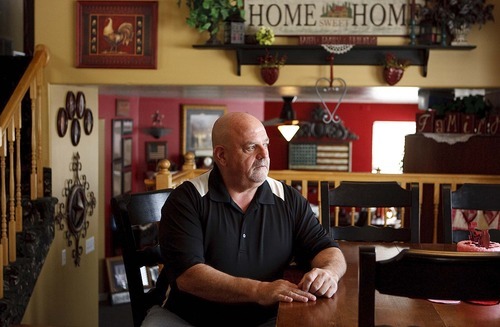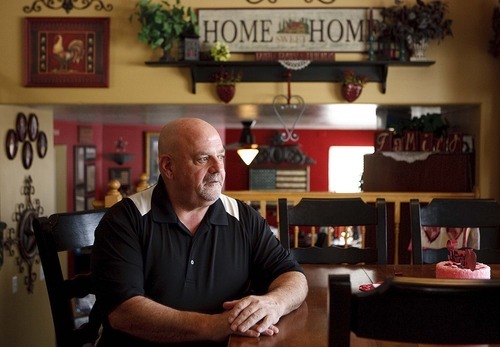This is an archived article that was published on sltrib.com in 2011, and information in the article may be outdated. It is provided only for personal research purposes and may not be reprinted.
Layton • A fortnight before Christmas, Layton Mayor Steve Curtis came home to a foreclosure notice tacked to his front door, saying his family's home would be sold Jan. 18 at auction.
Two months earlier, he and his wife, RaeLynn, had been notified by California-based ReconTrust Co. that foreclosure proceedings had begun on their home. The stunned couple had been working toward a modification of their loan with Bank America.
"We were astounded," Curtis said. "But the bank said not to worry, that ReconTrust was just another arm of the bank and we should keep making our payments to avoid foreclosure."
Shortly after the December notice, Bank of America denied the couple's loan modification — and Curtis decided to find legal help.
The Curtis home is among more than 10,000 properties in Utah that had been caught up in the foreclosure process by the end of 2010, according to Utah Attorney General Mark Shurtleff. Attorneys have been challenging foreclosures with lawsuits, arguing mortgage bankers and investors in bundled mortgages have not properly registered transactions with county recorders, and then violated state and federal laws in foreclosure proceedings.
One line of attack: Whether ReconTrust, a unit of Bank of America, is legally qualified to foreclose on Utah homes. Curtis says he may join a proposed class action lawsuit filed in November to press the point.
—
Homes in court • The 14-page complaint, filed in federal court in Salt Lake City, asserts ReconTrust does not have the authority to foreclose and sell homes under Utah law, a position recently joined by Shurtleff's office.
Craig Smay, a Salt Lake City title attorney and lead counsel for the National Association of Foreclosure Defense Advocates (NAFDA), views Utah's statute as black and white. He cites Utah code that "limits the power of sale to an active member of the Utah State Bar and any title insurance company." ReconTrust does not qualify, he says, and its foreclosures "are without authority and illegal."
But attorneys for ReconTrust and other companies named in the lawsuit have asked U.S. District Judge Dee Benson to dismiss the case, arguing that the same legal argument has been repeatedly rejected by federal judges in Utah. Bank of America attorneys have argued the federal National Bank Act governs the issue, not state law.
NAFDA Director Merrill Chandler says that in many of the dismissed cases, those questions about ReconTrust "kind of got lost in the wash" as judges grappled with multiple issues. One exception, Smay and Chandler concede, is a lawsuit filed on behalf of St. George resident Peni Cox, who challenged foreclosure proceedings of her home by ReconTrust.
U.S. District Judge Clark Waddoups ruled against her, saying federal law pre-empts Utah's statute. The case is now on appeal to the 10th U.S. Circuit Court of Appeals in Denver.
Shurtleff filed his brief in the Cox case last week, agreeing that under Utah law, trustees who sell foreclosed property must be either attorneys who are members of the Utah State Bar or title insurance companies. Federal statutes specifically state national banks may not act in violation of a state or local law, the brief says.
The Cox case comes up for a hearing on March 10.
"If ReconTrust doesn't have the right to foreclose Peni's home, it doesn't have the right to foreclose any Utah home," Chandler said, calling it a states' rights issue.
A website, nafdanow.org — and Facebook page, www.facebook,com
afda-now — will go live on Monday to recruit possible class members for the new lawsuit, Coleman v. ReconTrust. Anyone who has received a foreclosure letter from ReconTrust would qualify, he said.
ReconTrust's online numbers indicate it has 1,856 foreclosure sales pending in Utah. In a statement last week, Bank of America said its policy is to handle foreclosures in compliance with applicable laws, and noted it has completed more than 700,000 loan modifications since January 2008.
—
Still home, but for how long? • Curtis says he is speaking out about his foreclosure to let others know to both beware, and to seek help.
Curtis was laid off from First National Bank under recession-driven downsizing in 2009. He and his wife RaeLynn looked at all possible ways to trim expenses, including a mortgage loan modification on the five-bedroom suburban Davis County home house where they had lived and raised five children for 14 years.
Bank of America had acquired their mortgage from Countrywide, Curtis said, and the bank told him in March 2010 that it would consider him for the federal Home Affordable Modification Program that President Barack Obama had introduced to help homeowners stave off foreclosures.
Curtis said bank representatives told them to send in $300 less per month while their application was being processed. "They continued that process for over 10 months," Curtis said.
During that time, the Curtises "were very diligent" about resubmitting documents, such as tax returns and paycheck stubs, when asked, he said. "We never missed a house payment in our adult lives."
His wife spent several hours each week on the phone with bank representatives, carefully documenting conversations and subsequent actions they took to comply, he said.
Finally, seeing they were losing the fight against foreclosure, Curtis found a housing advocate through Utah's 211 hot line. He managed to postpone his home sale to March 1. He then reapplied with Bank of America for an "in-house" loan modification, and said he has received verbal approval but nothing in writing so far.
"We looked it up on ReconTrust," Curtis said, "who still had the foreclosure date set as March 1. We're still fighting it to make sure the right arm of the bank talks to the left arm of the bank."
cmckitrick@sltrib.com Tribune reporter Tom Harvey contributed to this report.







